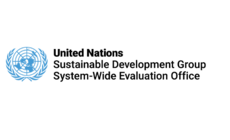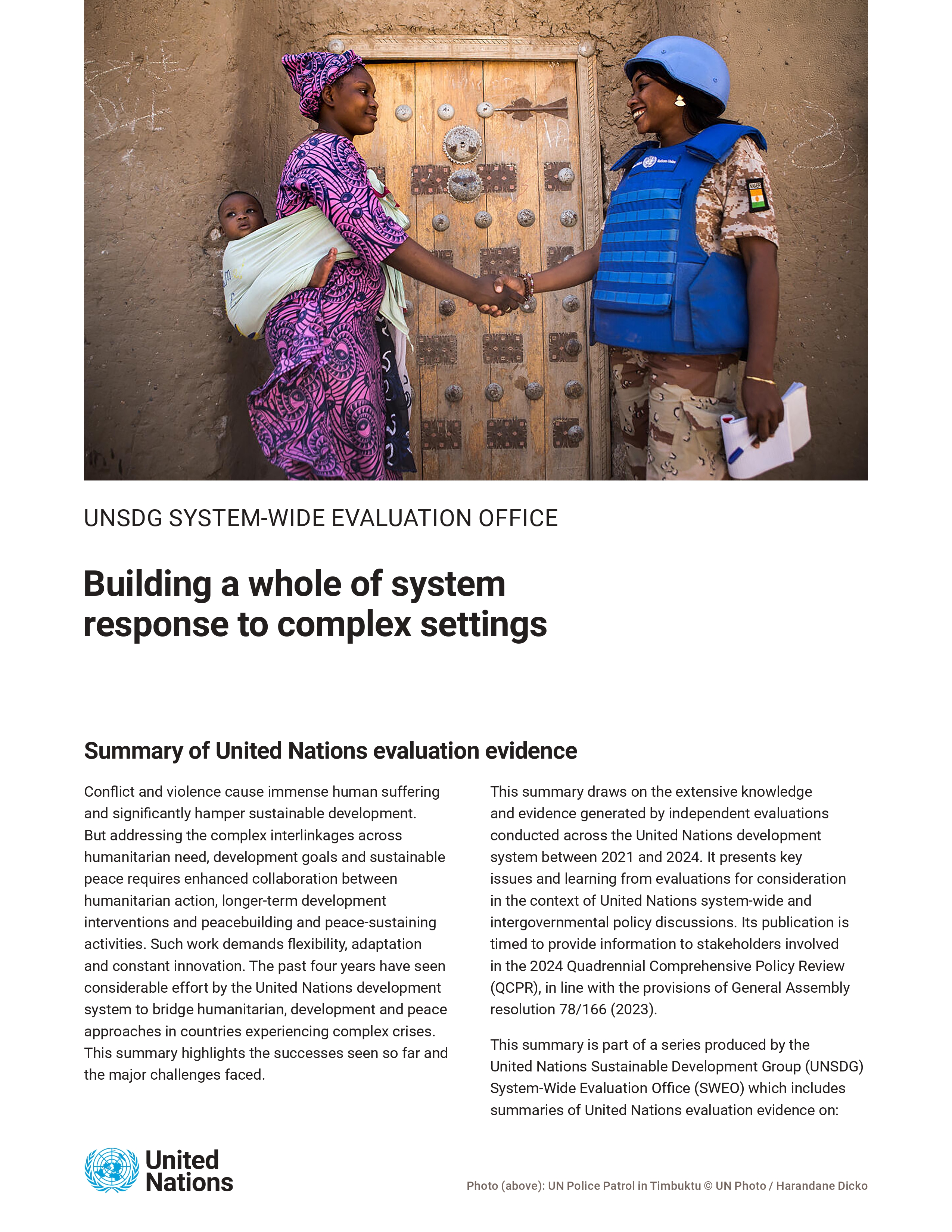Institution Background
The Office is responsible for the provision of independent evaluation evidence to strengthen learning, transparency, and accountability, to incentivize joint work and collective learning, and to conduct system-wide evaluations and advance evidence on the United Nations development system’s contribution towards achievement of the 2030 Agenda for Sustainable Development and the Sustainable Development Goals.
It is a standalone independent office within the United Nations Secretariat, to ensure independence, impartiality, and credibility. The Office is led by the Executive Director, reporting directly to the Secretary-General, but exercising operational independence in the performance of the evaluation function.
The Office provides leadership and strategic guidance for the system-wide evaluation function in accordance with the UNSDG System-Wide Evaluation policy. It advises DCO on the design and operationalization of evaluation quality assurance systems to support independent, credible, timely and useful Cooperation Framework evaluations.
The UNSDG System Wide Evaluation Policy sets out the shared roles and responsibilities for effective and useful system-wide evaluation which are assured by active engagement and cooperation across the United Nations development system and supported through collaboration with the evaluation offices of United Nations entities.
The Office prepares the Annual Report of the Executive Director of the UNSDG SWEO which is submitted to the Secretary-General and to the Economic and Social Council (ECOSOC). The report includes activities and achievements, results of quality assessments, management response status, progress in implementing the system-wide evaluation policy and highlighting learning from system-wide evaluations.
Evaluation Function
System-wide evaluations
System-wide evaluations provide an impartial assessment of the United Nations development system’s overall results and performance with a focus on collective results across the UN system. The purpose is to promote accountability and learning, offering credible, evidence-based insights that inform timely decision-making across the UN development system.
The universe of potential topics for system-wide evaluation activities encompasses:
- Priorities for the United Nations development system set out in the Quadrennial Comprehensive Policy Review (QCPR)
- Priorities emerging from intergovernmental summits and resolutions
- Pooled funds and joint initiatives in which United Nations entities are working towards a common objective
- United Nations system-wide strategies and plans
**At the country level, evaluations of the UN Sustainable Development Cooperation Framework are commissioned and managed by Resident Coordinators in collaboration with UNCTs to assess the contribution of the UNCT to achievement of national development results and progress towards the Sustainable Development Goals to inform subsequent Cooperation Framework cycles.
Independence
To ensure independence, impartiality, and credibility, the UNSDG SWEO is a standalone independent office (entity) within the United Nations Secretariat. The Executive Director reports directly to the Secretary-General but exercises operational independence in the performance of the evaluation function.
Agenda setting and planning
There is no coverage norm for global system-wide evaluations. The number varies from year to year with details set out in the multi-year Global System-Wide Evaluation Plan which outlines the purpose, scope, and resources. The plan prioritizes evaluations based on key criteria, balancing consultation and transparency with the UNSDG SWEO’s independence, considering independent analyses, available evidence, and emerging priorities.
Quality assurance and assessment
Quality assurance is integrated throughout the evaluation process to ensure high standards. Key features include:
- Using guidance, tools, checklists and quality criteria aligned with UNEG Norms and Standards.
- Establishment of evaluation management and reference groups to review key evaluation outputs.
- Hiring evaluators based on appropriate qualifications and experience.
Independent external quality assessment is conducted of all completed system wide evaluation reports after they are finalized. The results are made public and included in the Annual Report of the Executive Director.
Use of Evaluation
System-wide evaluations provide important evidence for users at country, regional, and global levels. Evaluations are carefully planned to address stakeholders’ concerns and provide timely, credible evidence for decision-making. Effective management and follow-up ensure the use of evaluation findings.
Key users are governing and legislative bodies and United Nations system entities and leadership including the United Nations Sustainable Development Group (UNSDG) and the United Nations System Chief Executives Board for Coordination (CEB) and its subsidiary mechanisms to ensure uptake of lessons and recommendations derived by the entities of the United Nations development system. Other key users include national governments, development partners, UN bodies, and other stakeholders like financial institutions, civil society, and academia.
The Office works to raise awareness and promote the uptake of the evidence generated through system-wide evaluation activities in cooperation with UNSSC, UNITAR and through partnership with other relevant United Nations and international evaluation and evidence bodies.
Key platforms for publishing system wide evaluation evidence include UNSDG SWEO, UNSDG and UN INFOwebsites.



